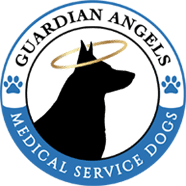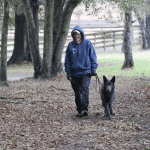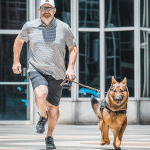At Guardian Angels, we put a major focus on understanding the law. It’s important to keep in mind that the law is not as simple as you may think because there is federal law and state law as well different regulations for the DOD, the VA, HUD, and the DOT.
There are also a variety of variables among a lot of pieces of the law which is why we focus on teaching the law to our newly paired teams. This helps to ensure that they know what their rights are. We also work with merchants on service dog laws to ensure they also know their rights.
“I teach a lot. I have extensive videos. I have been all over the country teaching very large groups of realtors, judicial systems attorneys, business owners, manager groups, etc. because they all need to know how to navigate through the convolutes of the law and have the right information. The merchants need to know what their rights are, how to recognize a proper working service dog, and what to do if it’s not,” said Carol Borden, Chief Executive Officer, and Founder.
“They also need to know how to recognize an imposter dog and what to do. As well as our own recipients, they have to know what’s okay and what’s not okay with their service dog. When they need to respect others in certain situations while being resected themselves.”
PAWS Act of 2021
The most recent development is the service dog law, Puppies Assisting Wounded Service Members Act of 2021, or the PAWS Act of 2021. This bill requires the Department of Veteran Affairs (VA) to implement a grant program to help pair service dogs with eligible veterans. Organizations that receive these grants will be required to provide veterinary health insurance coverage, travel expenses, and hardware for each service dog and veteran that participates in the program.
According to Congress.gov, Eligible veterans for this program are those who:
- Who are enrolled in the VA health care system
- Have been evaluated and treated for post-traumatic stress (PTS) but remain diagnosed with PTS
- May benefit from a service dog
- Agree to successfully complete training through an eligible organization.
Eligible veterans will be required to see a VA health care provider at least once every 180 days to ensure they continue to benefit from the service dog.
Eligible organizations are nonprofit organizations must meet the following requirements:
- Must meet publicly available standards set forth by the Association of Service Dog Providers for Military Veterans
- Must possess expertise in the needs of veterans with PTSD
- Must agree to cover all costs more than the grant amount to guarantee the benefits of the program for the veteran
- Must agree to reaccept or replace a service dog provided to a veteran
- Must submit an application to the VA
How is Guardian Angels Involved with Florida Service Dogs Laws?
Several years ago, Carol was asked by a Florida state senator to advise on service dog law. We set up some new state laws in the state of Florida, creating penalties for both imposter dogs and for merchants that refused actual working teams. What many people don’t understand is that the state law can’t supersede a federal law, but it can create laws to support federal law and address things that the federal law did not address.
Carol went to Tallahassee several times, where she testified in favor of a new service dog bill, which was passed into law. Once that happened, other states picked up on these actions. Carol was also asked to review multiple drafts of a service dog bill for Michigan which was voted into law. One of our Michigan service dogs was the first to receive a Michigan Service Dog patch.
Learn How You Can Contribute to The Guardian Angels Mission
To help us continue our mission of providing life-changing service dogs to our veterans in need, donate today! Your generous donations help us to feed, train, and pair our service dogs with recipients to help them regain their independence. Click here to check out our latest campaigns.
My name is Matthew McMurray. I am a twelve-year veteran of the US Army, and I served a tour in Iraq in 2003 where I was injured in the line of duty. After returning home, my family and I adopted a puppy from a shelter and named her Sandy. We had Sandy for almost thirteen years before she had to be put down due to illness.
While we had Sandy I was diagnosed with depression, anxiety, and PTSD, but my symptoms were not severe and were easily managed with medication. After Sandy’s death, I slipped into a deep depression and my anxiety made me become reclusive. I began having insomnia and suffered from night terrors. I also packed on nearly fifty pounds and started having heart palpitations and high blood pressure.
We had heard of Guardian Angels Medical Service Dogs at a high school football game where I had the opportunity to meet two teams, Eric and Sun and Patrick and Trooper. My wife, fearing that I was slipping away, recalled the encounter and suggested that I apply. I submitted my application a few weeks later.
Immediately after being paired with Cobalt, I noticed positive changes. I became more sociable and less withdrawn, I was no longer afraid of going to the grocery store or mall, I became more physically active, regained a positive outlook on life, my depression subsided enough to allow me to stop taking medication, and the night terrors stopped.
In the years since our pairing, I’ve gone on to start a new career as an Information Technology Auditor, nearly tripling my income. I’ve reconnected with old friends, rekindled old hobbies, and become an advocate for service dogs and veterans’ mental health. I have a renewed sense of purpose, confidence, and freedom. The transformation has been nothing short of a miracle, and I am indeed living an amazing “new normal”.
According to the Brain Injury Association of America, more than 5.3 million or one in every 60 people in the United States live with a permanent brain-injury-related disability.
What Are The Symptoms of a Brain Injury?
Brain injuries have complex effects that vary widely from person to person. The symptoms of a brain injury depend on factors such as location, cause, and severity.
When it comes to brain injury symptoms, some will show up immediately following the traumatic incident, whereas other symptoms may show up days or weeks later.
The symptoms that a person who experiences a brain injury may experience include, but are not limited to:
- Headaches
- Seizures
- Spasticity
- Loss of Balance and Increased Dizziness
- Sleep Problems
- Reduced Cognition (Awareness or Comprehension)
- Depression
- Personality Changes
No two brain injuries are the same. This list only serves to show a snapshot of the symptoms that someone with a brain injury can experience.
How Guardian Angels Medical Service Dogs Can Help
Our services dogs can assist someone with a brain injury in several ways, including:
- Balance support
- Retrieving dropped items
- Alerting to nightmares to improve sleep patterns
- Alerting prior to seizures and/or migraines
- Mitigating depression
A service dog can make a significant impact in the lives of those struggling with a brain injury by helping them during a medical or emotional emergency, providing balance and security in public places, and aiding with memory-related daily tasks.
To learn more about Guardian Angels Medical Service Dogs, contact us today.
Chris Weber, who has been with GAMSD for about 3 ½ years as a Development Project Administrator, joined the organization after recovering from a Traumatic Brain Injury. (more…)
At Guardian Angels, we are always innovative, and we are always looking for ways to make things better. It has been our philosophy for the last almost 12 years that anything we find to be a weakness or a need, we focus on it and try to come up with an innovative idea to make it stronger, make it better. (more…)
Under Federal Law, there is no restriction as to who may or may not train a service dog, however, there are multiple elements to consider…
Do you know how to choose the most appropriate dog to become a service dog?
Over 60% of the dogs that start out in professional training programs, do not pass resulting in them being adopted out. These are dogs being trained by professionals that still didn’t make it. Not every dog has all the characteristics necessary to be a service dog. They must be large enough, brave enough, and intelligent enough to do the job. They can never present a public safety threat and must be able to perform their tasks 90% of the time or more despite being in crowds, stores, or any unusual environment. If your chosen dog doesn’t make it, are you prepared to rehome him/or her after spending a year or more in training and start over with a new dog in hopes the next one will pass the rigorous training?
Do you have experience doing some of the most advanced dog training skills?
Most pet dog trainers, military dog trainers, police dog trainers, etc., have never trained service dogs or studied disabilities. As a result, we created a college accredited 2.5-year program to teach apprentices how to become service dog trainers. There are multiple components to training a service dog that are not part of training for other types of disciplines, therefore most trainers or individuals would not know how to train a dog to alert on a certain high or low for diabetes, or alert in advance for a seizure, or how to know when to hit an emergency help button if you were incapacitated or an elevator button, or wake someone from a night terror, etc. Even if you get through the house manners, confidence building, socialization, basic obedience, public access practice, etc. and your dog can pass all these components, are you able to teach him the required advanced tasks that legally qualify him/her to be a service dog?
Are you familiar with ADA and state laws, HUD, DOT, VA, DOD, and DOT regulations?
The service dog laws and regulations are very convoluted and confusing even for attorneys and judicial systems, thus we teach the law to hundreds of various professional groups every year, as well as all the teams we pair. Are you prepared to know when your rights are being violated or if you are violating the rights of someone else or a business? Do you know that certain laws vary from state to state? Did you know that churches, cruise lines and other countries are exempt or do not recognize our laws and regulations?
Do you know the proper etiquette expected of a dog in public?
There are high expectations of a properly trained service dog in public. A service dog should basically be invisible unless they need to perform a task. There are rules regarding being in restaurants, grocery stores, airplanes, etc. in which your dog must behave accordingly. Are you familiar with and is your dog trained to these expectations?
Sadly, these are just a few of the variables that make training your own service dog very challenging. The advantage of going through a professional organization is that all these things are handled for you, we bare all the expenses of raising and training the dog and then donate them to qualified recipients. The disadvantage is that most credible organizations have very long waiting lists.





